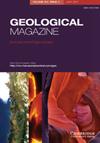地热系统中含Sb–Au的玉髓:来自Poggio Peloso(意大利托斯卡纳南部)碧玉的见解
IF 2
3区 地球科学
Q3 GEOSCIENCES, MULTIDISCIPLINARY
引用次数: 0
摘要
摘要对Pietratonda–Poggio Peloso Sb–Au矿床(意大利托斯卡纳南部)碧玉中的玉髓进行了详细的表征。主要目的是检索形成玉髓的地热流体和锑浓度来源的信息。使用光学显微镜、激光烧蚀电感耦合等离子体质谱和X射线衍射对该地区的玉髓和岩石类型进行了研究。所获得的结果使Pietratonda–Poggio Peloso的玉髓可以被描述为单一玉髓,因为Sb含量非常高,在文献中找不到比较。纹理显示出多代二氧化硅,与多次注入矿化溶液的环境非常吻合,具有可变的物理化学特征。迁移可能发生在碱性环境中,而水的酸化可能有利于在不同温度但不高于225°C的条件下沉淀。成分可能已经被浸出的岩石是宿主碳酸盐岩和周围的变质岩。在所检查的岩石中,变质岩与玉髓的对应关系最为丰富和显著,也是唯一发现离散金含量的岩石。本文章由计算机程序翻译,如有差异,请以英文原文为准。
Sb–Au-bearing chalcedonies in hot geothermal systems: insights from the jasperoids of Poggio Peloso (southern Tuscany, Italy)
Abstract Detailed characterization was performed on the chalcedonies from the jasperoids of the Pietratonda–Poggio Peloso Sb–Au deposit (southern Tuscany, Italy). The main purpose was to retrieve information on the geothermal fluids that formed the chalcedonies and the source of antimony concentrations. Investigations were performed using optical microscopy, laser ablation inductively coupled plasma mass spectroscopy and X-ray diffraction on both the chalcedonies and the lithotypes cropping out in the area. The results obtained allow the chalcedonies of Pietratonda–Poggio Peloso to be described as a unicum, based on the very high contents of Sb that do not find a comparison in the literature. The textures showed multiple generations of silica that agree well with an environment characterized by multiple injections of mineralizing solutions, bearing variable physicochemical characteristics. The transport likely took place in an alkaline environment, while the acidification of the water may have favoured the precipitation at varying temperatures but not higher than 225 °C. The rocks from which the constituents may have been leached are the hosting carbonates and the surrounding metamorphic rocks. Among the examined rocks, the metamorphic rocks showed the most numerous and significant correspondences with the chalcedonies and were the only ones in which discrete amounts of gold contents were found.
求助全文
通过发布文献求助,成功后即可免费获取论文全文。
去求助
来源期刊

Geological Magazine
地学-地球科学综合
CiteScore
4.70
自引率
0.00%
发文量
111
审稿时长
3 months
期刊介绍:
Geological Magazine, established in 1864, is one of the oldest and best-known periodicals in earth sciences. It publishes original scientific papers covering the complete spectrum of geological topics, with high quality illustrations. Its worldwide circulation and high production values, combined with Rapid Communications and Book Review sections keep the journal at the forefront of the field.
This journal is included in the Cambridge Journals open access initiative, Cambridge Open Option.
 求助内容:
求助内容: 应助结果提醒方式:
应助结果提醒方式:


